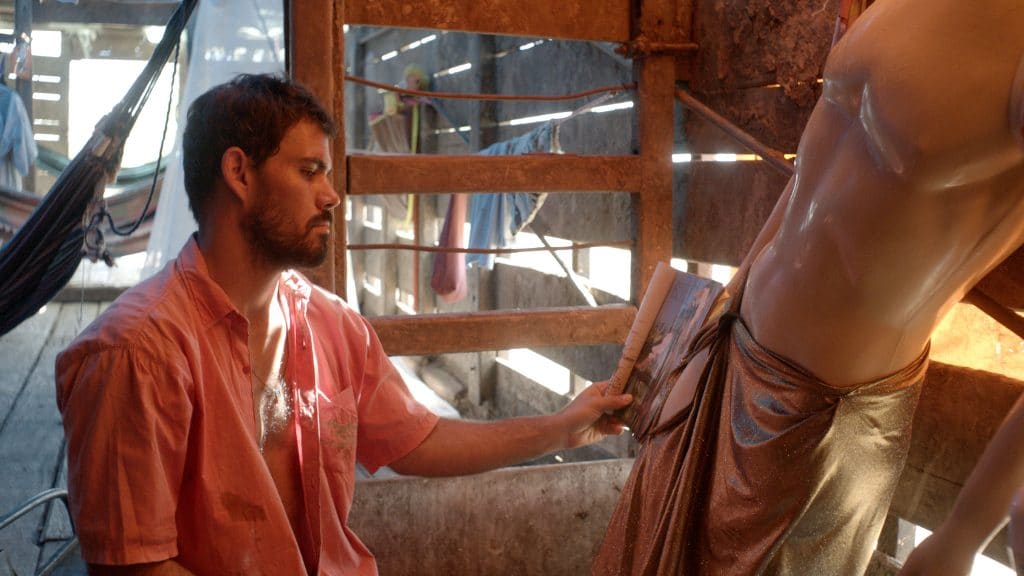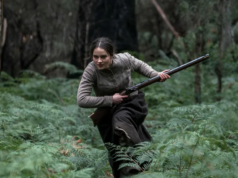In his second film, Gabriel Mascaro continues to display a splendid discipline as a storyteller and creates a wonderful drama that defies gender roles
Neon Bull (Boi Neon) (2015)
Written and directed by Gabriel Mascaro. Starring Juliano Cazarré, Maeve Jinkings, Vinícius de Oliveira, Alyne Santana, Josinaldo Alves, Samya De Lavor, Carlos Pessoa and Abigail Pereira.
Iremar (Juliano Cazarré) is a virile and handsome bull wrangler who works at the Vaquejadas, a traditional sport in the northeast of Brazil in which two men on horseback pursue a bull and try to violently pull the animal down by its tail to the ground. During the day, he feeds, takes care of the bulls, helps transport them from show to show and sands their tails to increase friction with the cowboys’ hands. At night, Iremar is at the worktable with his sewing machine making women’s clothes. You see, his dream is to become a fashion designer, so he loves to make custom horse masks and exotic outfits for Galega (Maeve Jinkings), one of his co-workers and the group’s truck driver, who also performs provocative dances for men.
If this premise sounds unusual, director Gabriel Mascaro (who also wrote the script) does a remarkable job making everything seem so surprisingly natural. Like with his first feature film, the excellent August Winds (2014), he adopts a rigorous approach that doesn’t draw attention to itself, as if all he wants is to portray this reality and the characters who live in it without intrusion or any sort of judgment. Neon Bull looks simple, despite being thematically ambitious, and so it is easy to miss the incredible complexity of what he is saying. It may take us more than one viewing to realize that but don’t misjudge it; Mascaro knows exactly what he wants to say and creates a beautiful film of strong bovine odors and distant dreams — dreams like Iremar’s.
When Neon Bull begins, we see him tending to the bulls and sanding their tails at a Vaquejada. After the show is over, he leaves to collect parts of mannequins and pieces of fabric from a large muddy field covered with discarded trash from the event. He uses them for the clothes he makes. It isn’t a common thing at all to see a bull wrangler who likes to sew women’s clothes in a country like Brazil, but we buy it. Iremar draws panties over the naked bodies of women on porn magazines and dreams of having his own brand (with his artistic name spelled with a Y) and a professional sewing machine. But he doesn’t even know what a vector logo is, and his life is buried deep in a world of bulls and dump. We can almost smell the scent from the other side of the screen.
But Neon Bull also reminds us all the time that art can be created from the most uncommon sources. At one moment, for instance, Iremar tells Galega’s daughter Cacá (Alyne Santana) about how ice cream is made from bull fat, and in another scene, we see him coloring bull tails with a golden spray (the ones that are pulled off the poor animals in that violent sport) to use for his fashion. But even more curious is seeing bull wranglers like those caring also about their own looks, straightening their hair or wearing perfume after handling the bulls. And in a fantastic inversion of gender roles, we get to see a woman giving perfume to a man and seducing him at her workplace.
Cazarré is a talented actor who understands that a masculine man can have a strong artistic sensibility (which may be obvious but not to a lot of people), and we buy into his character’s dreams. Iremar is not alone, though. The girl Cacá loves horses but doesn’t want to go and live with her grandparents or her father (who left home to find a better life elsewhere) for fear of leaving her mother’s apron string. But there is nothing more revealing than seeing her play with a shining Pegasus toy that she “flies” over the enclosed bulls. When Iremar says to Galega that Cacá likes horses, she replies: “Yes, but she’ll never be able to have one.” The realistic way her mother sees their lives is not only more telling than his answer: “That you don’t know.”
Galega, on the other hand, tries to make the best of that universe where they live, even though she is clearly tired of having to be a single mother and take care of Cacá on her own — at a given moment she actually says that out loud. That doesn’t mean she doesn’t love her daughter, and Jinkings makes us see her affection for the girl, like when she tells her to go to sleep because it is late. Closing the cast, we have fellow bull wrangler Zé (Carlos Pessoa), who shines in the film’s most hilarious moments (including a porn magazine whose pages are glued up with his sperm and a bizarre scene involving a horse masturbation) and the new guy Júnior (Vinícius de Oliveira), who develops a nice relationship with the rest of the group.
The actors do a great job, especially when they are together, like in a conversation that takes place on a truck. As the characters digress about bulls, horses and ice cream, the dialogue sounds almost improvised, and they are even interrupted by the bulls at one point before the actors resume talking as if nothing had happened. Everything is filmed with a discreet camera that usually remains still or slowly slides laterally in long takes that may perhaps go unnoticed.
But Mascaro also creates many evocative shots, like Galega performing a hypnotizing dance under an intense red light and wearing a horse mask (is “horse pop” a term?) or a lyrical scene in which we see a man in almost physical communion with a horse to the sound of a soft violin. Or when we see the neon bull of the title (which tells everything you need to know about the film), or a sex scene between two characters among the bulls whose fantastic framing creates a curious visual balance, with the couple to the left and the animals on the right side.
And if Mascaro already evokes strangeness with his use of green, red and blue neon lights, the film gets even crazier in a hilarious horse masturbation scene that will certainly put a lot of viewers off. Not to mention how he shows a group of naked men showering together or Iremar peeing with his penis showing. But still, nothing compares to a sensual and almost graphic five-minute sex scene made in a long take involving a pregnant woman. Just beautiful.
In fact, it takes no more than this scene to let us realize how Neon Bull is so full of conviction about what it wants to say, showing a woman who works as a security guard (usually a “man’s job”) at a clothing factory and seducing Iremar into having sex with her. I also love the moment when he tells her that his dream is to work at a clothing factory and how she acts totally fine with that. Sensitive until the very last scene, when we understand in just a few images the abyss between dreams and reality, Neon Bull is a film about dreams that will never come true.
And that is reflected in the melancholy lyrics of the song “Astronauta” played by Os Nonatos during the final credits (free translation): “As astronaut I visited planets/Went beyond the limits of the multicolored sky/Traveled on board of my thoughts/Made a flying saucer of my heart.”





